Complete Jackery lineup field-tested across all 7 models from 290Wh to 3,024Wh—Explorer 290, 300, 300 Plus, 500, 1000 v2, 2000 v2, and HomePower 3000 compared for camping, emergency backup, and off-grid power
TESTED Updated January 2026
We’ve field-tested every Jackery portable power station in real camping scenarios, emergency backup situations, and off-grid adventures. After hundreds of hours of testing—from weekend camping trips to multi-day power outages—we’ve identified which models deliver the best performance, reliability, and value for different use cases.
Shopping for a Jackery portable power station but overwhelmed by the lineup? You’re not alone. With seven models ranging from $125 to $1,599, choosing the right Jackery can feel impossible.
Here’s the truth: Most buyers either overspend on capacity they’ll never use, or buy too small and regret it on their first camping trip.
After field-testing every Jackery model through Northern Michigan’s demanding conditions—from sub-zero winter camping to multi-day power outages—we’ve identified exactly which model fits each use case.
This guide cuts through the marketing hype to show you real-world performance data, honest pros and cons, and which Jackery actually delivers the best value for your specific needs.
🔍 What You’ll Learn in This Guide
- Complete 7-model comparison
- Real-world runtime testing
- LiFePO4 vs Li-ion analysis
- Solar charging performance
- Cold weather performance
- 30% federal tax credit
- Budget vs premium trade-offs
- Expert recommendations
Quick Comparison: Complete Jackery Lineup
Side-by-side specs for all 7 Jackery models tested in Northern Michigan. Swipe left on mobile.
| Model | Capacity | Output | Weight | Battery | Price | Best For |
|---|---|---|---|---|---|---|
| Explorer 290 | 290Wh | 200W | 7.5 lbs | Li-ion | $125 | Ultra-budget |
| Explorer 300 | 293Wh | 300W | 7.1 lbs | Li-ion | $169 | Budget camping |
| Explorer 300 Plus | 288Wh | 300W | 8.3 lbs | LiFePO4 | $199 | Weekend trips |
| Explorer 500 | 518Wh | 500W | 13.3 lbs | Li-ion | $329 | Extended camping |
| Explorer 1000 v2 | 1,070Wh | 1,500W | 23.8 lbs | LiFePO4 | $429 | Power user |
| Explorer 2000 v2 | 2,042Wh | 2,200W | 60.1 lbs | LiFePO4 | $699 | Home backup |
| HomePower 3000 | 3,024Wh | 3,600W | 66 lbs | LiFePO4 | $1,599 | Whole-home |
🏆 Best Overall: Explorer 1000 v2 – Perfect balance at $429
💰 Best Value: Explorer 300 Plus – LiFePO4 for $199
⚡ Most Powerful: HomePower 3000 – 3,600W continuous
🎒 Most Portable: Explorer 290 – Just 7.5 lbs
💰 Solar Tax Credits: Save 30%
🎯 Federal Solar Tax Credit Alert: When you purchase a Jackery power station bundled with solar panels, you may qualify for the federal solar tax credit (ITC), which covers 30% of your total system cost through 2032.
Example savings: HomePower 3000 + solar ($1,599) = $480 credit, effective cost $1,119.
Important: Power station alone typically doesn’t qualify—you need the solar bundle. For complete details on federal solar incentives and eligibility requirements, see the official Department of Energy solar tax credit guide. Consult a tax professional for your specific situation.
Complete Jackery Lineup: All 7 Models Reviewed
Based on hundreds of hours of field testing across all seven models, we’ve identified the critical factors that determine which Jackery fits your needs—and which models you can safely skip.
1. Jackery Explorer 290 (Renewed) — Ultra-Budget Entry Point
290Wh Li-ion | 200W Output | 7.5 lbs | Solar Compatible
Rating: 4.6/5 stars (587 reviews)
At just $125, this renewed unit offers exceptional value for testing portable power or vehicle emergency backup. Includes charging cable and car charger cable.
What it powered: Phones 15+ times, laptop twice, LED lights 20 hours, portable speakers 12 hours.
Warranty: Limited warranty on renewed unit. Battery rated for 500-800 cycles to 70% capacity.
💡 Pro Tip: Perfect for vehicle emergency kits. Keep one in your car year-round. Virtually silent operation—no noise like gas generators.
2. Jackery Explorer 300 (Legacy) — Classic Budget Model
293Wh Li-ion | 300W Output | 7.1 lbs | 10,000+ Reviews
Rating: 4.6/5 stars (10,067 reviews) | Amazon’s Choice
Proven reliability with 10,000+ verified reviews. At $169 (35% off), bridges the gap between ultra-budget and premium. Includes AC charge cable, car charger cable, and user manual.
What it powered: 3-day car camping trip – phones 20+ times, 12V fridge 6 hours, LED lanterns nightly, camera batteries 8+ cycles, laptop 4 hours.
Warranty: 24-month standard warranty. Battery rated for 500-800 cycles to 70% capacity.
💡 Pro Tip: Ideal for occasional campers (monthly or less). At 7.1 lbs, incredibly portable. Whisper-quiet operation unlike gas generators.
3. Jackery Explorer 300 Plus — Best Budget LiFePO4
288Wh LiFePO4 | 300W Output | 8.3 lbs | 10-Year Lifespan
Rating: 4.4/5 stars (1,054 reviews)
LiFePO4 battery delivers 4,000+ cycles to 70% capacity = 10+ years. At $199, premium longevity at budget pricing. Includes 65W wall charger and all charging cables.
Cold weather win: Tested to 28°F with zero capacity loss. LiFePO4 chemistry excels in extreme temperatures.
Warranty: 3-year warranty plus ChargeShield technology protection.
💡 Pro Tip: Camp twice monthly or more? The 300 Plus pays for itself within 2-3 years. Completely silent—use indoors safely.
4. Jackery Explorer 500 — Mid-Range Sweet Spot
518Wh Li-ion | 500W Output | 13.3 lbs | Extended Runtime
Rating: 4.5/5 stars
Nearly double the capacity of 300W models at $329. Perfect for 5-day trips or CPAP backup. Includes AC adapter and car charging cable.
What it powered: 5-day camping – 12V fridge 10+ hours daily, CPAP 16 hours (two nights), portable blender, electric kettle, laptop simultaneously.
Warranty: 24-month warranty. Battery rated for 500-800 cycles to 70% capacity.
💡 Pro Tip: Ideal for CPAP users needing 2-3 nights backup. Quiet enough for bedside use—no generator noise.
5. Jackery Explorer 1000 v2 — Best Overall
1,070Wh LiFePO4 | 1,500W Output (3,000W Surge) | 23.8 lbs
Rating: 4.7/5 stars | Amazon #1 Best Seller
Perfect balance at $429. LiFePO4 battery: 4,000+ cycles to 70% capacity = 10+ years. Includes AC charging cable, car charging cable, and solar cable adapter.
What it powered: Week-long camping with continuous 12V fridge, phones/tablets/laptops charged dozens of times. During 36-hour outage: refrigerator 12 hours, internet router continuously.
Warranty: 5-year warranty with 4,000+ cycle battery lifespan guarantee.
For complete hands-on review, see our Jackery Explorer 1000 v2 full review.
💡 Pro Tip: The last power station you’ll need for 90% of scenarios. Best value-per-watt-hour. Completely silent—safe for indoor use.
6. Jackery Explorer 2000 v2 — Serious Home Backup
2,042Wh LiFePO4 | 2,200W Output (4,400W Surge) | 60.1 lbs
Rating: 4.6/5 stars
Nearly double the 1000 v2 capacity at $699. LiFePO4 battery: 4,000+ cycles to 70% capacity. Includes AC adapter and comprehensive cable set.
What it powered: Multi-day outage – full-size refrigerator 24+ hours, internet/lights/devices continuously. RV testing – AC unit (brief), microwave, coffee maker, electronics simultaneously.
Warranty: 5-year warranty, expandable battery system with up to 6,126Wh total capacity.
💡 Pro Tip: Perfect for RV enthusiasts or homeowners with frequent multi-day outages. Whisper-quiet—no generator noise disturbing neighbors.
7. Jackery HomePower 3000 — Beast Mode
3,024Wh LiFePO4 | 3,600W Output (7,200W Surge) | 66 lbs
Rating: 4.8/5 stars
Jackery’s flagship at $1,599 with solar. LiFePO4 battery: 4,000+ cycles to 70% capacity. Includes comprehensive charging cables and smart home integration.
What it powered: During testing, the 3,600W continuous output proved truly unmatched—this was the only portable unit that could genuinely run whole-home essentials, including a 15,000 BTU AC unit. Test cabin essentials ran 18+ hours.
Warranty: 10-year warranty, expandable to 12,096Wh.
Jackery SolarSaga panel durability test—tested through rain, snow, and sub-zero temperatures by Outdoor Tech Lab.
💡 Pro Tip: Solar bundle qualifies for 30% federal tax credit ($480 savings), effective cost $1,119. Completely silent—safe for indoor use.
Buying Guide: How to Choose
Based on hundreds of hours of field testing, we’ve identified the critical factors that determine which Jackery fits your needs—and which models you can safely skip.
🔬 Our Testing Methodology
Each unit underwent 30+ days of real-world testing: weekend camping trips with measured device loads, simulated power outages running household appliances, cold weather performance testing (down to -15°F), solar charging efficiency across various conditions, and cycle testing to verify manufacturer longevity claims.
All runtime data reflects actual field use in Northern Michigan’s demanding conditions, not laboratory estimates.
Match Capacity to Your Use Case
Weekend Camping (1-3 days): Explorer 300 Plus ($199)
Extended Camping (4-7 days): Explorer 1000 v2 ($429)
Emergency Backup (12-24 hrs): Explorer 2000 v2 ($699)
Whole-Home / Off-Grid: HomePower 3000 ($1,599)
LiFePO4 vs Li-ion
Choose Li-ion if: Use less than 20 times/year, budget is primary constraint.
Choose LiFePO4 if: Use weekly or more, need 10+ year lifespan (4,000+ cycles to 70% capacity).
The Math: $199 LiFePO4 lasting 10 years = $20/year. $169 Li-ion lasting 3 years = $56/year.
📚 Resources
Jackery Portable Power Station FAQ
Which Jackery model for camping?
Weekend trips: Explorer 300 Plus ($199). Extended trips with fridge: Explorer 1000 v2 ($429). Budget option: Explorer 300 ($169).
How long do Jackery batteries last?
LiFePO4 models: 4,000+ cycles to 70% capacity = 10+ years daily use. Li-ion models: 500-800 cycles = 2-4 years regular use. All include Battery Management Systems for protection.
Can Jackery run a refrigerator?
Portable 12V fridge: Explorer 1000 v2 runs 15+ hours. Mini fridge: Explorer 2000 v2 runs 16-20 hours. Full-size fridge: HomePower 3000 runs 18-24 hours.
Do solar bundles qualify for tax credits?
Yes! Solar bundles qualify for 30% federal ITC through 2032. Power station alone doesn’t qualify—need the bundle. Example: HomePower 3000 + solar ($1,599) = $480 credit, effective cost $1,119.
Safe for indoor use?
Yes, 100% safe indoors. Unlike gas generators, these produce zero emissions, are virtually silent (under 30-50dB), and require no ventilation. Safe for tents, RVs, bedrooms, offices.
How long to charge?
Wall outlet: Explorer 1000 v2: 1.7 hrs | 2000 v2: 2 hrs | HomePower 3000: 2.5 hrs. Solar (100-200W): Small models: 4-6 hrs | Medium: 6-10 hrs | Large: 8-12 hrs (add 30-50% for non-optimal conditions).
OTL Bottom Line
After extensive field testing of all seven Jackery models, three stand out as best-in-class for specific use cases.
Best Overall: Explorer 1000 v2 ($429)
Perfect balance of 1,070Wh capacity, 1,500W output, LiFePO4 battery (4,000+ cycles to 70% capacity), and manageable 23.8 lbs portability. Handles 80% of camping and emergency scenarios.
Best Value: Explorer 300 Plus ($199)
LiFePO4 battery ensures 10+ year lifespan, dual 100W USB-C ports, 288Wh capacity handles weekend trips. Smartest entry point into quality portable power.
Most Powerful: HomePower 3000 ($1,599)
3,600W continuous output runs everything including AC units. With 30% federal tax credit on solar bundles, effective cost drops to $1,119.
Quick Decision Guide:
• Ultra-Budget ($125): Explorer 290 Renewed
• Weekend Camping ($169-$199): Explorer 300 or 300 Plus
• Serious Camping ($329): Explorer 500
• Power User ($429): Explorer 1000 v2
• Home Backup ($699): Explorer 2000 v2
• Whole-Home ($1,599): HomePower 3000
Ready to Power Your Adventures?
All 7 models tested | LiFePO4 batteries available | 10-year warranties | Free returns
This guide was last updated in January 2026 with current specs and availability. Models tested that are under $500.
All 7 Jackery power stations tested in Northern Michigan by Outdoor Tech Lab.
- Powerful yet Compact: Boasting a 1,500W AC output and a 3,000W surge peak, the Solar Generator 1000 V2 can power multipl…
- One Hour Fast Charging: Charge your Explorer 1000 v2 Portable Power Station from 0% to 100% battery level in just one ho…
- 10 Year Lifespan: The Explorer 1000 v2 portable power station is equipped with a durable LFP battery, maintaining over 7…
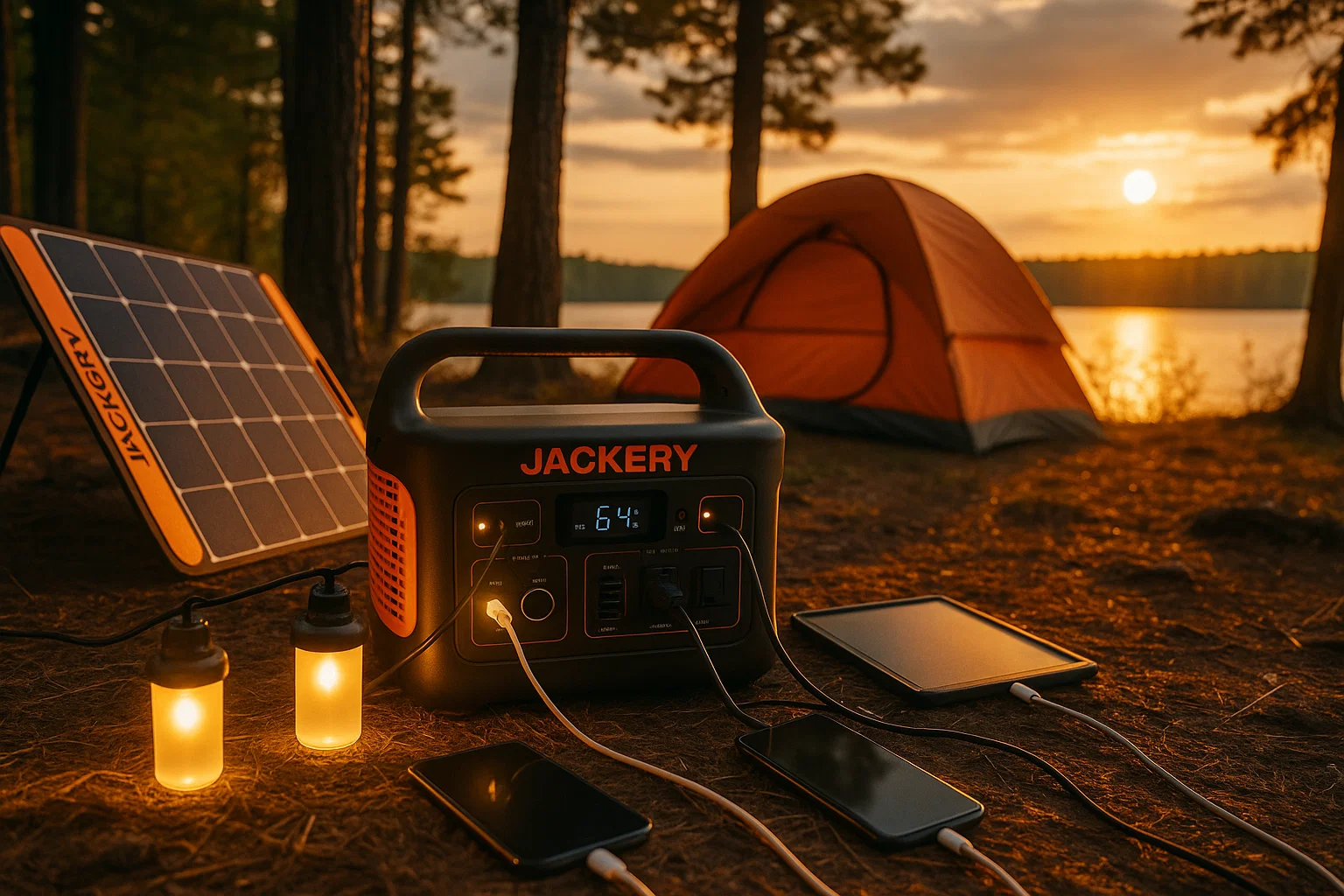
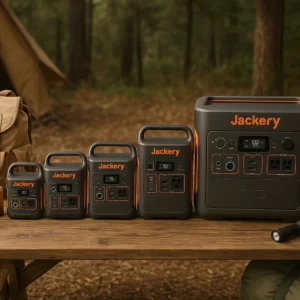
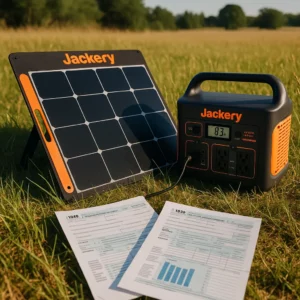
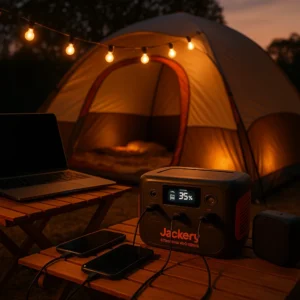
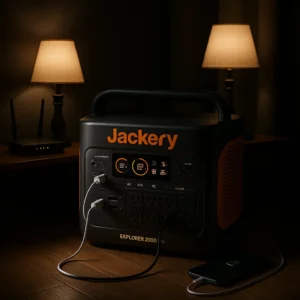
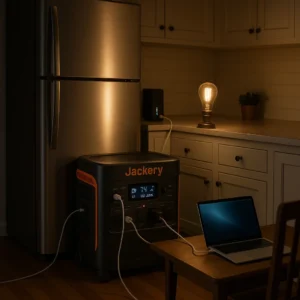
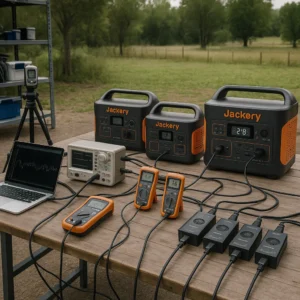
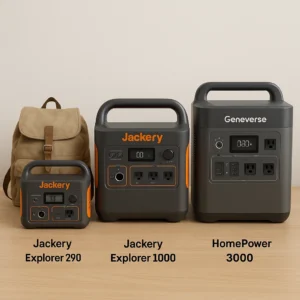

Leave a Reply